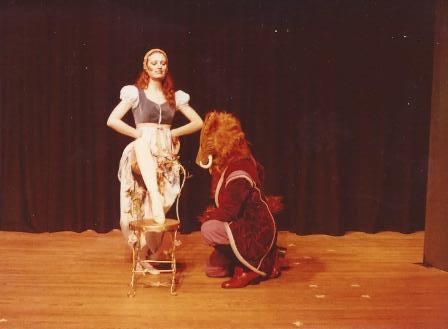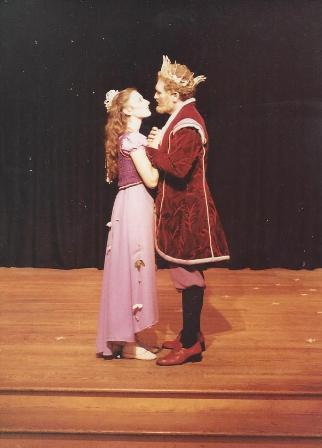The Grapevine Art & Soul Salon
Entertaining Ideas: Charles Knott
Finding Voice and Myth through Performance
When I was a child, I was practically mute. I'd like to write about that�about emerging from a painful expressive paralysis through entering the ultra-expressive world of theater. Beyond that, I would like to go into the challenge set for us by C. G. Jung: finding the myth that best expresses one�s own personal identity.
Because I'm an extreme introvert, I didn�t start acting until the advanced age of 36, and I have often wished that I had started much, much earlier. To my surprise, when I began writing this reflection, I remembered that I actually had experimented with performance at an early age.
The dramatic portal opened into my soul in my ninth grade classroom, of all unlikely places. I must have been 15 years old. We had been reading The Rime of the Ancient Mariner, and I couldn�t understand one word of it. Then, wonder of wonders, my teacher put on a Camden recording of Richard Burton reading that piece. His voice seemed to come from the center of the earth. I think it was the most beautiful sound I had ever heard. Synchronistically, not long after that, my father brought home a Wilcox Gay reel-to-reel tape recorder!
I started reading The Rime of the Ancient Mariner into the tape recorder, trying to sound like Richard Burton. Eventually, by virtue of these efforts, I actually began to understand the poem itself. This reading of The Rime was the beginning of my self-imposed vocal training. I loved it and did it by the hour. It was a natural activity for me because it gave me pleasure as well as a safe place to leave vocal restraint behind and actually use my voice. On the one hand, I found safety in the fact that no one else could hear me; on the other, I was spurred on by a narcissistic gratification in being able to hear myself. At this point, I started �finding my voice� as a person.
The gains I made in the safety of my room did not immediately translate into the social world in which I was trying to function. But the struggle to establish who and what I was as a human being was definitely furthered through the dramatic action of "performance" reading.
In the Joseph Campbell/Bill Moyers interviews, Campbell told a story in which a bird sang. Campbell said that the bird�s song, in the context of the story, symbolizes myth, which is the �song� of all humanity. Having been inspired by Richard Burton's reading, and being presented gratis with a tape recorder, I began finding my own voice and speaking a wonderful myth written by Samuel Taylor Coleridge. Through Burton and Coleridge and the beautifully timed arrival of the tape recorder, I was able to discover mythic expression, not only as a spectator but as a performer. Speaking metaphorically, I became that bird that Campbell described and The Rime was my song. Coleridge wrote The Rime, but that story becomes everybody's story eventually: we do something we should not do; we become alienated and suffer through a dark night of the soul; we emerge through a act of divine grace, older and wiser.
Jung reminds us that each must find our own myth, and James Hillman points out that the way we tell our story is the way we live our lives. So my life, my story, and my connection to dramatic performance all coalesced into the discovery of my own unfolding myth. I feel that I know some of my myth, but I still wonder what much of it is; at times I am so close to the story that I can�t see it. I can only know my story as I tell it and reflect on it, and so my voice reveals my life to me. I attempt to listen closely to what I say, and, more and more, to what I write.
In this context, what does theater mean to me?
The difference between actual lived life and imaginal life is an open question. If one performs a role in theater, is that the same as living that role outside of theater? The best answer I can make to this question is, No, it is not the same, but it might be just as important; in fact, depending on the amount of reflection and self-awareness the actor brings to the part, the enacted role could be even more important than lived life. Playing a role can allow an actor to become momentarily bigger than life, and that can bring not only a rush of excitement but can be therapeutic as well, because a psychological space has been opened in which one can live a larger life.
An enacted role is, in a compressed form, an imitation of life. Role playing gives one the opportunity to examine the meaning of action in an efficient way. Creating imitative, dramatic actions for the sake of performance changes the body as the new thoughts and behaviors become part of muscle memory, and it changes the mind, as new synapses form to accommodate the thoughts and feelings of the character. I believe these mind and body changes can be a valid and even heroic way to satisfy the expressive demands of unlived life. In a sense, unlived life can be transformed into lived life through acting.
The individual life may not furnish all the opportunities we need to live out our potentials. Leftover potentials are consigned to the imagination, and a life of imagination should certainly be cultivated; however, the difference between imagining a life potential and enacting a life potential is huge. It is like the difference between remembering a dream and telling a dream; fantasizing a story and writing a story; imagining an image and painting that image. Theater is the giant creative matrix that allows us to concretize our imaginal life.
The implications are spectacular. This means theater gives you nothing less than an opportunity to express your own life fully, if you have the strength and courage to do so. In theater, you can experience and realize and, to a degree, live dramatically anything you can imagine. And your imagination is enhanced by the script: a playwright has imagined things that have never occurred to you and asks that you, as actor, embody his or her fantasy�incarnate it, bring it into physical reality. Actors blend their own fantasies with those of the script, and so unlived life is not only invited onto center stage, it often revisions itself by interacting with the role written by another. One's unlived life not only expresses itself, it becomes a creative collaborator.
To look at it a different way, all of the patterns of human life are recorded in stories. The "big" stories that hold these patterns most efficiently are myths. I remember hearing Campbell say, "Every psychological impulse has a mythological counterpart." In theory, if we could act out every myth, we could act out, and therefore experience, every life potential.
The point is that to enact stories, or themes from stories, is to imitate life, and that is a form of living life. Enacting life is living life in a compressed form through imitation. In this sense, you really can have any life you want. And you can extend the richness of your life endlessly by tracing the patterns of myth through enactment; the potentials of human life�all of which are presented in the poetry of myth�can never be exhausted. To live out these potentials is an open challenge to anyone who desires actively to pursue individuation. Your individuation needs can never exhaust myth or theater, because you are only one person, and they contain all of life. As Oscar Wilde once said, �Show me a man who claims to have exhausted life, and I will show you a man life has exhausted.�
What has theater done for me?
Theater has enabled me to dance around as a comic emperor in The Emperor�s New Clothes, to the screaming laughter and approval of children. It has enabled me to transform from a terrifying Beast to a "radiantly handsome Prince" who wins the love of Beauty. It has enabled me to play a dynamic and irrepressible comic villain in a musical adaptation of a Shakespeare play. It has enabled me to play a suave, sophisticated anti-hero in a Noel Coward play, a conflict-torn Catholic priest in love with a nun, and a comical retired ship's captain in his 80s. I have lived the roles of Falstaff, Petruchio, Oberon, and Oedipus, and have embodied and expressed D. H. Lawrence and Dylan Thomas on stage.
In my soul, I know that I am a part of all that I have read and comprehended through the years, but, even more so, I am a part of all that I have played on the stage. Theater has always been a ready and faithful psychological midwife nurturing and transforming me, a man who began life as a muted and intimidated child.
My quest is to be exhausted by life, and, as I get older, I find that�s not such a tall order. And, there are other dramatic milieux that support the individuation process including, but by no means limited to, fiction writing and, in drama therapy, role playing. In fact, my psyche itself resembles a picaresque novel. I can sometimes step outside my life and imagine myself to be Roderick Random about to embark on the next adventure. The picaresque hero is always ready to take center stage in his own life, and, as Hamlet says, "The readiness is all."


Copyright 2016, Barbara Knott. All Rights Reserved.